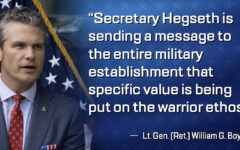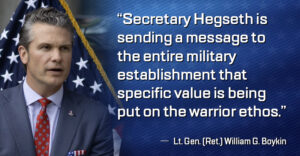Vaccine litigation lingers after lifting of military mandate
6 February 2023 2024-05-18 15:30Vaccine litigation lingers after lifting of military mandate
Federal appeals court judges closely questioned a Biden administration attorney Monday on the consequences military personnel might face for refusing COVID-19 vaccinations, even though Biden’s vaccine mandate for military personnel has been rescinded.
Lawyers for a group of Navy SEALS and other Navy personnel who refuse to be vaccinated for religious reasons told a 5th U.S. Circuit Court of Appeals panel that federal court injunctions against the mandate are still needed, in part because decisions on deployments and assignments can still be made based on vaccination status.
“Is there any assurance on the record, that there will be no deployment decisions based on vaccination?” Judge James Ho, one of three judges hearing the case asked Department of Justice lawyer Casen Ross.
Ross said such questions were speculative and not at issue in the case before the court. Ho and Judge Kyle Duncan noted that the administration had only reluctantly ended the military mandate after December congressional action, but Ross assured the panel that there are no plans to bring back the requirement.
“Given the prevailing public health guidelines and the state of the virus, there is currently no intention to require universal vaccination of all service members,” Ross said.
The Pentagon formally dropped the requirement in January following a December vote in Congress to end the mandate. However, vaccine opponents note that commanders can still make decisions on how and whether to deploy unvaccinated troops, under a memo signed last month by Defense Secretary Lloyd Austin. . . . . (read more, AP News)
Lawyers for U.S., Navy Seals battle over revoked Covid-19 vaccine mandate (Politico, 6 FEB 23)
A lawyer representing Navy Seals who do not want to be vaccinated against Covid-19 told a federal appeals court Monday that their lawsuit over a now-withdrawn vaccine mandate isn’t moot even though Congress passed legislation last December ordering the policy canceled.
During arguments before the 5th Circuit Court of Appeals in New Orleans, attorney Heather Hacker said the service members still face the possibility of discipline over their refusal to get vaccinated and the government has not ruled out taking vaccination status into account when doling out future assignments.
“Even though the mandate has been repealed, the Navy will continue to use vaccination status as a requirement for the class members to be able to fulfill their job duties,” Hacker said during the 40-minute argument. “It’s even worse now because the Navy will not even consider the plaintiffs requests for religious accommodation anymore.” . . . (read more)
Pentagon COVID-19 Personnel Policy Delays Leave Unanswered Questions (US Navy Institute News, 7 FEB 23)
The Pentagon has offered limited guidance in the three weeks since Secretary of Defense Lloyd Austin officially rescinded the COVID-19 vaccination mandate, leaving service members with questions about their statuses.
Austin officially rescinded the COVID-19 vaccination mandate on Jan. 10 after the order’s removal passed as part of the Fiscal Year 2023 National Defense Authorization Act.
According to Austin’s memo, the Department of Defense would cease any separation of those who refused to get the COVID-19 vaccine, which had already been on pause since President Joe Biden signed the NDAA on Dec. 23.
For the Navy, that meant at least 4,095 sailors who had their separations paused as a result of legal action over religious exemption requests would no longer face separation.
But their status and that of the 2,089 sailors who were forced to leave the service is unclear.
Here’s what’s known so far: . . . (read more)
The military has lifted its vaccine mandate, but won’t automatically reinstate troops who defied it (Texas Public Radio, 7 FEB 23)
At issue: Should ex-troops continue to face consequences for refusing the vaccine order, even though the order has been rescinded?
Though the military is now allowing troops to serve even if they refuse the COVID vaccine, it’s less clear what will happen to about 8,400 people who were discharged for refusing it — or who left voluntarily.
Congress overturned the Pentagon’s vaccine mandate in December, reversing a policy Defense Secretary Lloyd Austin put in place in 2021.
Department of Defense spokesperson Sabrina Singh said mandate or not, the Department’s recommendation is simple.
“Even though we have rescinded the vaccine mandate, we’re going to continue to encourage our service members, our civilians, to take the vaccine,” Singh said. “It’s free, it’s easy, it will save your life.”
Singh said the Pentagon will not automatically reinstate people who refused the shot while the mandate was in place. It also won’t give them back pay.
“If they wanted to rejoin the military, they would have to follow the process, just like anyone else who would want to join for the very first time,” Singh said.
For advocates and some congressional Republicans who argued the vaccine should have been optional all along, the repeal doesn’t go far enough.
“On the one hand, it stops the mandate going forward,” said Mat Staver, co-founder of the Liberty Counsel, a Christian ministry organization that advocates for religious freedom. “But on the other hand, there are people that have been discharged and/or are currently in the military under punishment, and that has to be resolved.”
Staver said the mandate was unconstitutional from the start because it infringes on the religious and free speech rights of service members. The U.S. Supreme Court last year upheld the Navy’s right to re-assign sailors who refuse the vaccine, with Justice Brett Kavanaugh writing that the courts should defer to the judgment of military commanders.
But Staver has filed additional lawsuits on behalf of former service members who applied for a religious exemption but were denied.
“Those that have been separated for any reason whether they have religious or non-religious objections to these mandates should be allowed to return with back pay,” Staver said. . . . (read more)






























